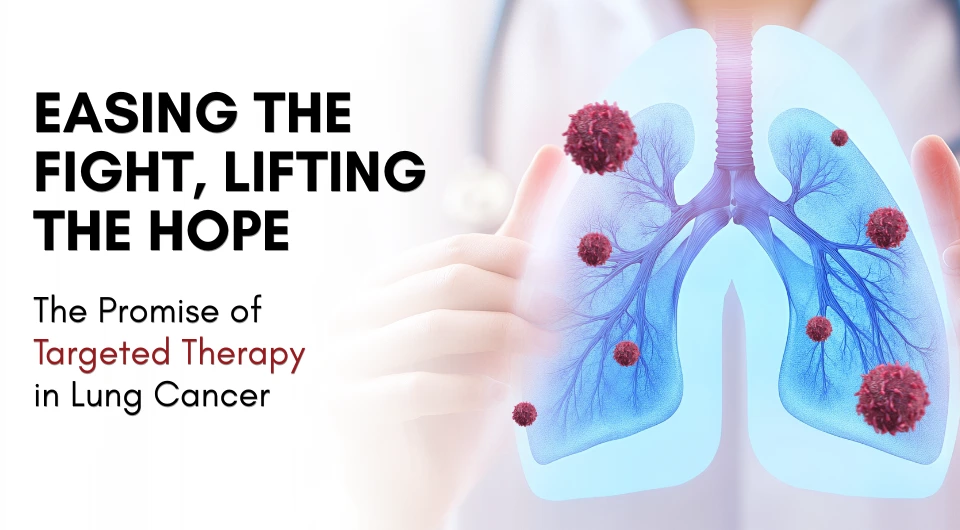“Cancer opens many doors. One of the most important is your heart.”
These words by Greg Anderson remind us that while disease can shake us to the core, it also strengthens our will to face the storm. Cancer, a word that many fear, and understandably so. It can enter quietly but leaves a loud, lasting impact, not just on those diagnosed, but their loved ones too.
Many of us have heard of cancer, seen people around us go through it, or maybe even faced it. And while it can feel like the end of the road, it is also true that there is always a light at the end of the tunnel. With rising awareness in the world of health and wellness, you will hear more people, on podcasts, blogs, or social media, talking about how certain habits or exposures may lead to cancer. But the one thing often missing is clarity.
In this blog, we’ve aimed to explore:
- What exactly is cancer?
- What happens in the body when it develops?
- And when it comes to specific types like lung cancer, is it treatable?
What Is Cancer? When Cells Grow Without a Pause
Remember learning in school that the cell is the basic unit of life? That same cell builds tissues, and those tissues form the organs that keep us going. Normally, old or damaged cells die, and new ones take their place, like a smooth-running machine.
But what happens when this process is hindered?
That is when cancer can show up. Cancer occurs when some of these cells don’t stop growing, even when they are damaged. Instead of dying, they continue to multiply and can form lumps called tumors. Some tumors remain in one place (benign), but others spread to nearby areas or even travel to other parts of the body (this is called metastasis).
The root of this often lies in our genes, tiny instructions inside our cells. These changes can happen as we age or due to exposure to things like tobacco smoke or too much sun. Typically, the body clears out faulty cells, but as we get older, this system weakens.
Cancer can affect many parts of the body, even the blood. But when it comes to the most commonly impacted areas, the lungs are right at the top. In fact, lung-related cancers, including those in the windpipe (trachea) and airways (bronchus), are among the most common types worldwide.
With this understanding, let’s look closer at lung cancer, one of the most common and serious types.
How Common Is Lung Cancer?
According to the World Health Organization’s 2022 data, there were around 2.48 million new cases of lung cancer worldwide. When looking at gender, an estimated 1.57 million of these cases were among men, which makes up about 63.4% of the global lung cancer burden. Among women, the number was estimated at around 908,000 cases, which is 36.6% of the total.
In the United States alone, the American Cancer Society has shared its estimates for 2025, predicting about 226,650 new cases of lung cancer. Of these, around 110,680 are expected in men and 115,970 in women.
So, what is lung cancer exactly?
It happens when abnormal cells in the lungs start growing out of control. This can harm how your lungs work and, if not treated, can become very serious.

Some common signs of lung cancer are a cough that doesn’t go away, chest pain and trouble breathing. One might also feel unusually tired, lose weight without a clear reason, or frequently develop lung infections. Sometimes, coughing up blood (called haemoptysis) can also be a symptom.
If anyone notices any of these signs, it is important to see a doctor as soon as possible for a check-up. An early intervention by a doctor can be helpful for the treatment.
But here the question comes to everyone’s mind: can lung cancer be cured? Let’s understand this in detail.
Is Lung Cancer Curable?
Yes, lung cancer can be curable, especially when it is detected and treated at an early stage before it has spread beyond the lungs. We’re fortunate to live in a time when advanced medical care is available for both minor and serious conditions like lung cancer.
There are several treatment options, including surgery, chemotherapy, radiation therapy, and targeted therapy. But before going further, one should also know that lung cancer is of two main types and is classified in different stages.
Types and Stages of Lung Cancer
There are commonly two types of Lung Cancer:
1. Non-small cell lung cancer (NSCLC)
2. Small cell lung cancer (SCLC)
Each type is staged differently to help guide treatment.


Understanding the type and stage is crucial for understanding the treatment approach. Among the available treatment options, targeted therapy is gaining attention for its personalized approach.
What Is Targeted Therapy for Lung Cancer?

Targeted therapy is a type of cancer treatment that focuses on specific genes, proteins, or other factors that enable cancer cells to grow and spread. It is often used for people with non-small cell lung cancer (NSCLC), especially in advanced stages.
Doctors first test an individual’s cancer to see if it has any of these specific mutations. If it does, targeted therapy may be more effective and have fewer side effects than chemotherapy.
Here’s How Targeted Therapy Differs from Traditional Chemotherapy:
Chemotherapy, which attacks all fast-growing cells throughout the body and kills both cancer and healthy fast-growing cells (like hair or gut cells), which can cause strong side effects.
On the other hand, Targeted Therapy is:
- Much more precise in its approach.
- Specifically targets cancer cells with certain mutations or changes.
- Spares most healthy cells, which usually means fewer side effects.
How Does It Work?
Targeted therapy works in different ways depending on the mutation. Here are the main types:
A. Tyrosine Kinase Inhibitors (TKIs)
These are pills that block signals telling cancer cells to grow and divide.
Used for mutations like EGFR, ALK, ROS1, MET, RET, BRAF, HER2, and KRAS.
Example: Erlotinib, Gefitinib
B. Antibody-Drug Conjugates (ADCs)
These use the immune system to attach a drug directly to the cancer cell. Once attached, the drug releases chemotherapy straight into the cancer cell. Usually given intravenously (IV), which means the medicine is given directly into a vein.
Example: Trastuzumab deruxtecan
Note: ADCs are an evolving area in lung cancer, with more options in clinical trials.
C. Angiogenesis Inhibitors
These stop cancer cells from growing new blood vessels, cutting off their food supply. Often made from lab-created immune proteins called monoclonal antibodies.
Example: Bevacizumab and Ramucirumab.
Conclusion
In conclusion, Lung cancer can feel overwhelming, but there’s hope and ways to fight back with the right help. By staying informed about symptoms and treatment options, you and your loved ones can take meaningful steps in the fight against this disease. If you or someone you care about is at risk, don’t hesitate to speak with your doctor about lung cancer screening and whether targeted therapy could be right for you. Early detection truly saves lives, so never ignore warning signs.
Remember: No one is alone on this journey; support and help are always available.
Disclaimer: This blog/content is for informational purposes only and should not be considered medical advice. Always consult a healthcare professional before starting any treatment. The content is not intended to diagnose, treat, cure, or prevent any condition. Purchase medications only from reputable sources to ensure safety and authenticity.

